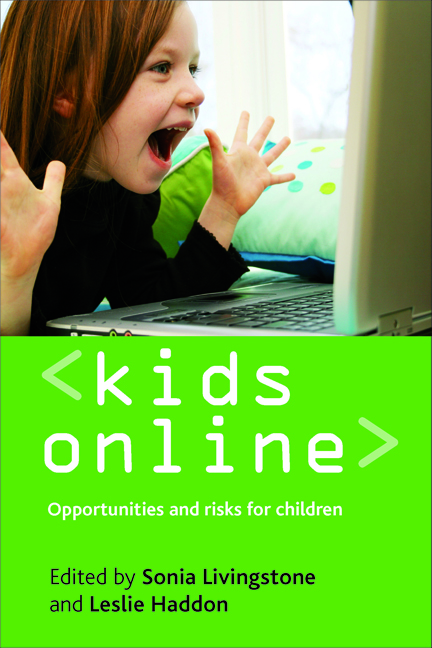Book contents
- Frontmatter
- Contents
- Notes on contributors
- Acknowledgements
- one Introduction
- Section I Researching European children online
- Section II Going online: new opportunities?
- Section III Going online: new risks?
- Section IV Policy implications
- Appendix A List of country codes
- Appendix B Children and parents online, by country
- Appendix C The EU Kids Online network
two - What we know, what we do not know
Published online by Cambridge University Press: 15 July 2022
- Frontmatter
- Contents
- Notes on contributors
- Acknowledgements
- one Introduction
- Section I Researching European children online
- Section II Going online: new opportunities?
- Section III Going online: new risks?
- Section IV Policy implications
- Appendix A List of country codes
- Appendix B Children and parents online, by country
- Appendix C The EU Kids Online network
Summary
The assumption that young people are more future-oriented, more apt and more technologically aware and interested than adults (Rushkoff, 1996) is not new. To some extent, it is believed that young people's early adoption of and adaptation to new media and technologies such as the internet are mainly the result of the inherent interest adolescents are assumed to have in new technologies as well as their massive use in formal educational settings (Lee, 2005). This group, ‘the Net generation’ as dubbed by Tapscott (1998), is important because, even though they may actually represent the future and, in fact, be ‘the vanguard’, they also constitute a vulnerable group, potentially ‘at risk’ from some of the new information and communication technologies (ICTs) (Livingstone, 2002: 2).
But what do we know about this age group and their online behaviour? What does current research tell us about children's experiences online? Does research provide enough evidence of the positive and negative consequences of children's uses of the internet? Based on the identification and analysis of almost 400 European studies about children and their online practices, this chapter seeks to identify the key research questions regarding children's access and uses of the internet and related online technologies. Here we also attempt to map the emerging research agenda, reflecting on current pressing research gaps and on the principles that have guided research so far and those that should guide future research in the field.
An overview of existing available research
In order to get the best possible picture of research carried out in Europe, the European Union (EU) Kids Online project mapped out the available research on children's access to and use of the internet and related online technologies in the 21 countries participating in the network (see Staksrud et al, 2009).
To accomplish this, it was decided to create a repository that would contain relevant data on research carried out in the field mainly during the period 2000-08, allowing the addition of some earlier studies if they were highly relevant. In total, 408 studies of children and the internet were collected and analysed (see Figure 2.1, which includes multicountry studies as well as single country ones).
- Type
- Chapter
- Information
- Kids OnlineOpportunities and Risks for Children, pp. 19 - 30Publisher: Bristol University PressPrint publication year: 2009



